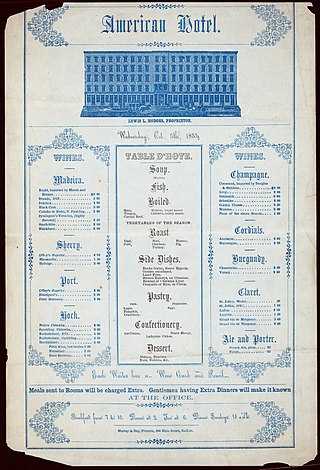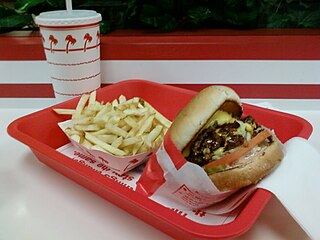Related Research Articles

Loblaw Companies Limited is a Canadian retailer encompassing corporate and franchise supermarkets operating under 22 regional and market-segment banners, as well as pharmacies, banking and apparel. Loblaw operates a private label program that includes grocery and household items, clothing, baby products, pharmaceuticals, cellular phones, general merchandise and financial services. Loblaw is the largest Canadian food retailer, and its brands include President's Choice, No Name and Joe Fresh. It is controlled by George Weston Limited, a holding company controlled by the Weston family; Galen G. Weston, is the chair of the Loblaw board of directors, as well as chair of the board of directors and CEO of Canada-based holding company George Weston.

Kensington Market is a distinctive multicultural neighbourhood in Downtown Toronto, Ontario, Canada. The Market is an older neighbourhood and one of the city's most well-known. In November 2006, it was designated a National Historic Site of Canada. Robert Fulford wrote in 1999 that "Kensington today is as much a legend as a district. The (partly) outdoor market has probably been photographed more often than any other site in Toronto."

The Paramount Fine Foods Centre, formerly the Hershey Centre, is a multi-purpose sports and entertainment complex located in Mississauga, Ontario, Canada. Its current name was adopted on July 1, 2018, following a new naming rights agreement with Mississauga-based restaurant chain Paramount Fine Foods.

Happy hour is a marketing term for a time when a venue such as a restaurant or bar offers reduced prices on alcoholic drinks. Discounted menu items like appetizers are often served during happy hour. This is a way for bars and restaurants to draw in more business before or after peak business hours.

Yorkville is a neighbourhood and former village in Toronto, Ontario, Canada. It is roughly bounded by Bloor Street to the south, Davenport Road to the north, Yonge Street to the east and Avenue Road to the west, and it is part of The Annex neighbourhood. Established as a separate community in 1830, it was annexed into Toronto in 1883. Yorkville comprises residential areas, office space, and retail shopping.

A buffet can be either a sideboard or a system of serving meals in which food is placed in a public area where the diners serve themselves. A form of service à la française, buffets are offered at various places including hotels, restaurants, and many social events. Buffet restaurants normally offer all-you-can-eat food for a set price, but some measure prices by weight or by number of dishes. Buffets usually have some or mostly hot dishes, so the term cold buffet has been developed to describe formats lacking hot food. Hot or cold buffets usually involve dishware and utensils, but a finger buffet is an array of foods that are designed to be small and easily consumed only by hand, such as cupcakes, slices of pizza, foods on cocktail sticks, etc.

A blue-plate special is a discount-priced meal that usually changes daily: a term used in the United States and Canada by restaurants, especially diners and cafes.

A food truck is a large motorized vehicle or trailer, equipped to storage, transport, cook, prepare, serve, and/or sell food. Historical predecessors of food trucks were horse-drawn chuck wagons and lunch wagons. Some, including ice cream trucks, sell frozen or prepackaged food; others have on-board kitchens and prepare food from scratch, or they heat up food that was prepared in a brick-and-mortar commercial kitchen. Sandwiches, hamburgers, french fries, and other regional fast food fare is common. By the early 2010s, amid the pop-up restaurant phenomenon, food trucks offering gourmet cuisine and a variety of specialties and ethnic menus became particularly popular. Food trucks may also sell cold beverages such as soda pop and water. Food trucks, along with food booths and food carts, are major components of the street food industry that serves an estimated 2.5 billion people every day.

Greektown, also known as The Danforth, is a commercial-residential neighbourhood and ethnic enclave in Toronto, Ontario, Canada. It is located on Danforth Avenue, between Chester Avenue and Dewhurst Boulevard, in east Toronto. Named after Asa Danforth, Jr., an American contractor who designed Queen Street and Kingston Road, the area is known for its architecture dating back to as early as 1910, and for its number of Greek restaurants and stores. The area was one of the major settlement areas of Greek immigrants to Toronto after World War I.

In restaurant terminology, a table d'hôte menu is a menu where multi-course meals with only a few choices are charged at a fixed total price. Such a menu may be called prix fixe. The terms set meal and set menu are also used.

A cover charge is an entrance fee sometimes charged at bars, nightclubs, or restaurants. The American Heritage Dictionary defines it as a "fixed amount added to the bill at a nightclub or restaurant for entertainment or service." In restaurants, cover charges generally do not include the cost of food that is specifically ordered, but in some establishments, they do include the cost of bread, butter, olives and other accompaniments which are provided as a matter of course.
Daniel Boulud is a French chef and restaurateur with restaurants in New York City, Palm Beach, Miami, Toronto, Montréal, Singapore, the Bahamas, the Berkshires and Dubai. He is best known for his eponymous restaurant Daniel, in New York City, which currently holds two Michelin stars.
New York Restaurant Week, also known as NYC Restaurant Week is an event held twice a year in which participating restaurants in New York City offer prix fixe lunches and dinners. At the finest restaurants, this can be a fraction of the usual prices.

Komi is a Washington, D.C., restaurant operated by Chef Johnny Monis, serving Italian- and Greek-influenced dishes.
Lunch is a meal eaten around the middle of the day. It is commonly the second meal of the day, after breakfast, and varies in size by culture and region.
Early bird dinner is a dinner served earlier than traditional dinner hours, particularly at a restaurant. Many establishments offer a seating prior to their main dinner seating with a reduced price menu, often more limited in selection than the standard dinner menu. Some restaurants offer specific meals or meal options which are sometimes referred to as "early bird specials". The term was first used for a clothing sale in 1904, and then in restaurants in the 1920s.
The WinterCity Festival held in Toronto, Canada, is a 14-day citywide celebration of culture, creativity and cuisine. WinterCity is three festivals in one, The WOW Series, The Warm Up Series and Winterlicious.

.The Dine Out Vancouver Festival, organized by Destination Vancouver, is a citywide food festival held in Vancouver. It is the largest event of its type in Canada, and attracts more than 100,000 locals and tourists to Vancouver's restaurants for 17 days each year.

A combination meal, often referred as a combo-meal, is a type of meal that typically includes food items and a beverage. They are a common menu item at fast food restaurants, and other restaurants also purvey them. Combination meals may be priced lower compared to ordering items separately, but this is not always the case. A combination meal is also a meal in which the consumer orders items à la carte to create their own meal combination.
Chicago Restaurant Week, is an event held once a year for seventeen days in which participating restaurants in Chicago offer prix fixe lunches and dinners. A celebration of Chicago's culinary scene featuring some of the finest restaurants, this can be a fraction of the usual prices.
References
- ↑ Winterlicious' cold shoulder 'City-wide' event is a great idea -- so why isn't it open to any restaurant willing to participate? Toronto Sun Thursday, February 5, 2009
- ↑ Furue, Kaori (July 17, 2009). "Summerlicious-ish". Torontoist . Ink Truck Media . Retrieved July 16, 2017.
- ↑ "Canadian Trademarks Details (application no. 0916134)". Canadian Intellectual Property Office . Retrieved July 16, 2017.
- ↑ A Word of Winterlicious Warning. Torontoist. January 30, 2009
- ↑ "Dishing Licious dirt;" Toronto Star. Toronto, Ont.: Feb 4, 2009. pg. L.4